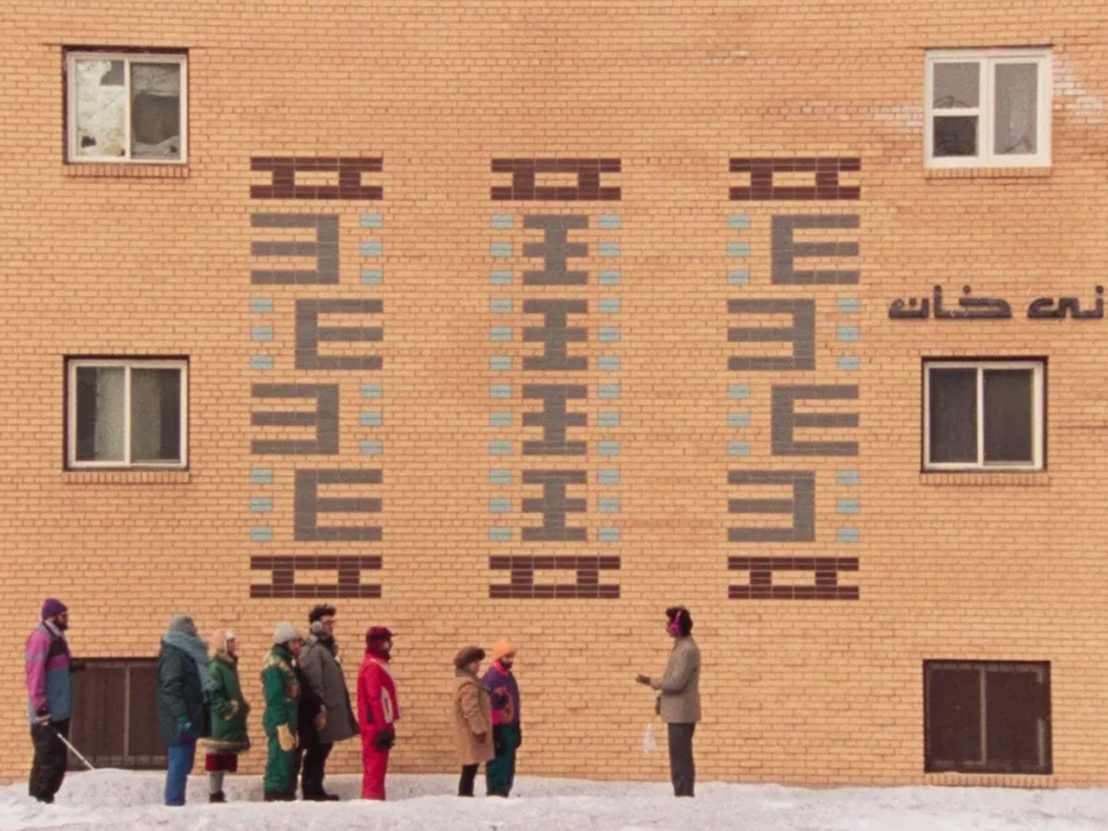
The clashing cultures of Canada and Iran are fused in Matthew Rankin’s dryly comic follow-up to The Twentieth Century.
The phrase “drastic departure” doesn’t even begin to do justice to the gear-shift undertaken by Matthew Rankin from his debut feature The Twentieth Century — a screwloose alternative history lesson about Canada’s most masturbation-obsessed Prime Minister — to his unexpected sophomore effort, Universal Language.
Mounted on soundstage labyrinths of surrealistic geometric design, the former may well have come to us from a distant planet; as a studious homage to Iranian New Wave form-breakers that uses sparser elements of style to collapse the distance between Winnipeg and Tehran, the latter’s origins are easier to triangulate.
His bone-dry dramedy plays out in an alternative Quebec where the tensions between French- and English-speaking locals have been subsumed by the new national language of Farsi, one expression of an overall Iran-ification in setting. The translational aspect facilitates a handful of solid sight gags — the image of a Tim Horton’s sign in Perso-Arabic script deserves at least a chuckle — though the cross-cultural links have more to do with thematic overlap than anything else.
As Rankin (who is white, a fact he owns up to by appearing as himself in absurdist interludes about governmental bureaucracy) explains via the press notes in which he interviews himself, the decision to situate the film in its faux-Middle Eastern twilight zone “emerged organically” from a story related to him by his grandmother; as a girl, she’d found a two-dollar bill frozen in a block of ice, and the adventure undertaken to extract it came to remind her grandson of Abbas Kiarostami and Jafar Panahi’s tales of clever, deceptively-mature children.
Rankin moved past drawing mere inspiration from Kanoon, the Institute for the Intellectual Development of Children and Young Adults responsible for funding many of Iran’s masters in their careers’ formative phases, and instead pursued the highest form of flattery. And who can blame him? Rankin himself admits that “Iranian cinema emerges out of 1000 years of poetry while Canadian cinema emerges out of 40 years of discount furniture commercials.”
But any risk of abstracting racial identity into a set of aesthetics and ideas rather than experiences — I was, against my will, reminded of that thing where the Great White North’s favorite son Drake decides to try out a few bars of Jamaican patois or Arabic to spice up his music — is complicated by Rankin’s honest collaboration with executive producers/co-screenwriters Pirouz Nemati and Ila Firouzabadi.
In more than just their demographic difference, the production team represents the multi-cultural makeup of a modern Canada while looking ahead to a future in which such divides have been even further dissolved. With “a premise of no borders and universal solidarity” as their stated goal, they followed a wryly utopian line of thinking “about how ‘there’ is also ‘here’ and how everybody around you is also you.”
Despite a comic sensibility pitched more toward the arch than sophomoric with throwaway chuckles about the “Winnipeg Earmuff Authority,” Rankin’s sophomore effort also diverges from The Twentieth Century in its sincere emotionality, the shedding of tears being one key motif in its stew of whimsical recurring iconography.
Many of Rankin’s off-beat creative choices stem from the same deprecating love for his home of Quebec, portrayed in drab beiges and greys dividing up the city into a “beige district” and “grey district.” It’s all said with clear affection, the same openness of spirit behind the goodwill-ambassador attitude that guides this experiment in emulation. In his filmmaking as in his self-insert’s Kafkaesque deliberations onscreen about immigration catch-22s, Rankin dreams of porous borders allowing for free and open exchange, a hopeful ideal that nonetheless flattens and negates nagging questions of authorship and authenticity.
Though they also say that the good artists borrow while the great steal, and there’s little in here to contradict the image of Rankin as an emerging major name, his historical sense of curiosity honed by pared-down technique. Having brought the world to Canada, he’ll soon bring Canada to the world.
Published 21 May 2024